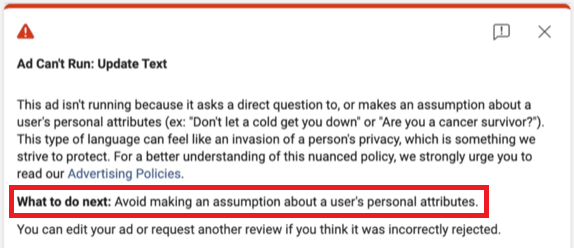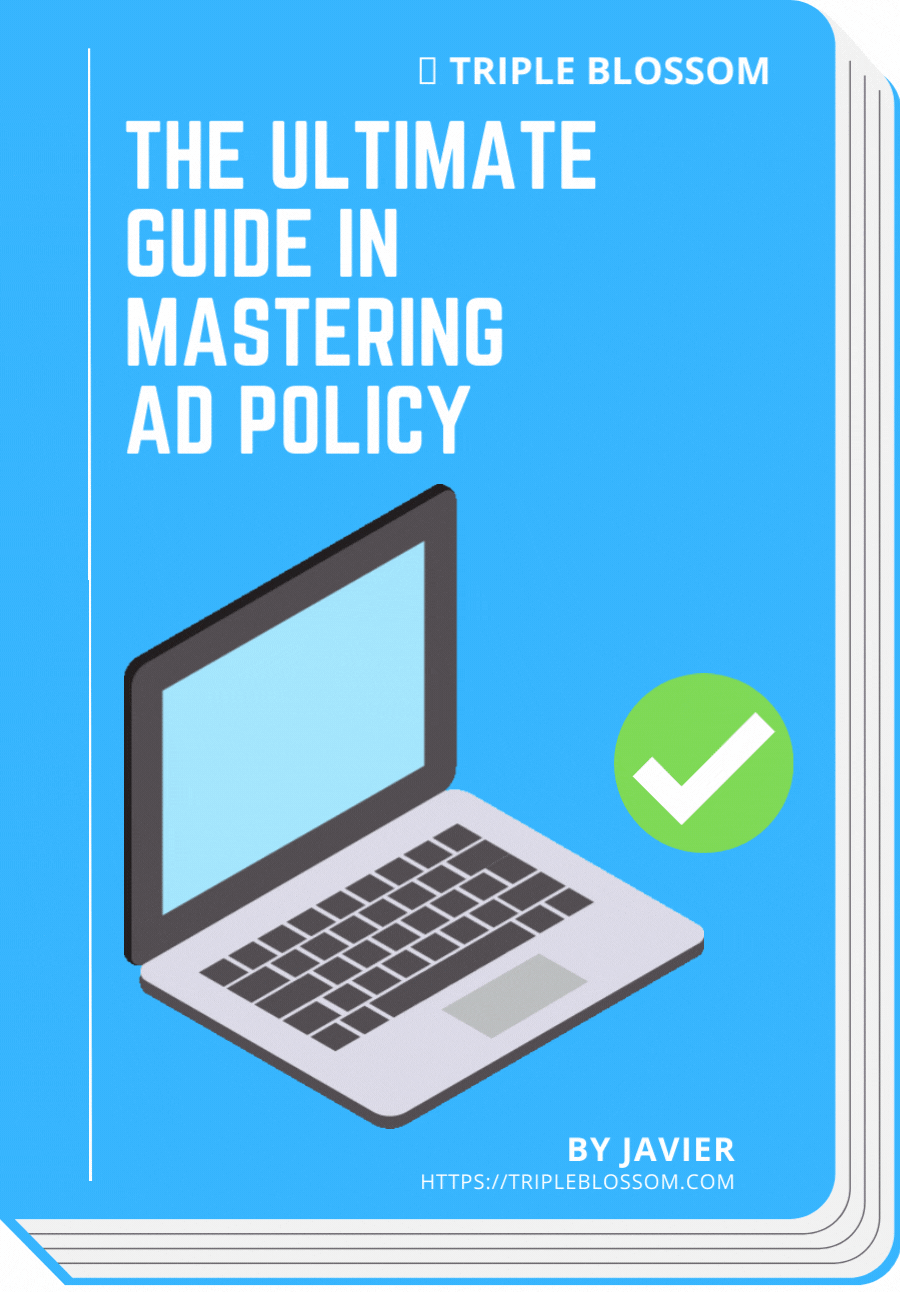How To Fix Facebook "Personal Attributes" Policy

This ad isn't running because it asks a direct question to, or makes assumption about a user's personal attributes.
I have been seeing more and more ad rejections picking up because of "Personal Attributes" - aka identifying your targeting with Facebook users in your ad copy. Most of them struggle with one word in general - "You".
- I have seen ads that have questions and ones that use “you” so why is mine rejected and not theirs?
- They said no personal attributes allowed on the ads, but didn’t mention landing pages. Is it not allowed as well?
- I've already tweaked it once and made it super vanilla and they rejected it again. I feel like it's automated.
- Now it has me overthinking the copy and without being able to use "you", it makes the copy kinda stupid.
As part of the best practice in Copywriting, you want to write in a way that resonates with your customers by putting yourself in their shoes. You craft your ad copies to speak their tone of voice so that you sound like an understanding person who is giving a piece of advice or a solution.
However, Facebook said you're being "Too Personal".

Facebook doesn't want their users to know that YOU know so much about users so if you do it, they will disapprove your Facebook ads. Too many rejected ads lead to an ad account ban.
Here are 3 tricks to transform your ad copy without referencing personal attributes:
1. Avoid Using Words like "You" and "Other"
Facebook doesn't like ad copy that makes it obvious to your target audience that they're being targeted. That's the rule of thumb.
They even don't like ad copy that uses the word "you" a lot (although you can probably get away with it).
- "The choice is yours to live life expanded."
- "Are you struggling with dull, aging skin..."
- "More than 1/3 of women form bunions, making it painful to continue to wear your favorite heels."
The "you" thing is not a myth when it’s associated with personal physical/mental attributes including race, gender, or health conditions. What you need to do is simply change the way you write your ad copy.
Take a look at the examples below:
- "Take the choice and live life expanded."
- "It's hard to take care of your skin."
- "Forming bunion makes it painful to continue to wear favorite heels."
In short, reference a real fact without relating to a person's attribute, and without the use of "you". Taking the word away won't make your ad copy look stupid - you can always include a call to action e.g. "Get the offer now" at the end of your ad copy to bring out the excitement.
2. Use Third-Person Narrative
- "Did you realize that you have been doing this wrong?"
- "Do you want to become as energetic as other women?"
Asking a question - there's no issue at all.
However, the context of your question often results in assuming a person's attribute. This triggers Facebook to review your ads on whether you discriminate against a person or a group of Facebook users.
The fix is simple - don't ask questions, but use a third-person narrative.
Here's how I would rewrite the copies:
- "He realizes he has been doing it wrong, and he takes the initiative to rectify his mistake."
- "She becomes energetic and lives her life to the fullest."
Not only that I'm not asking any questions, but also addressing another person's experience positively, and using his/her outcome as my ad copy. In this manner, your viewer won't have a hard feeling:
"What? How do you know this is me!"
but rather
"Wow I can do this too!".
3. Use First-Person Testimony On Landing Page
You might be thinking it's all about your ad copy and creative, but the landing page is also part of your ads, right?
For the amount of "you" that you have been reading throughout this blog post, it won't make it through the eyes of Facebook reviewers. As such, your copywriter may have provided you with an aggressive landing page to improve your conversion rate. On Facebook Ads, you have to be less aggressive.
The following example is a Big NO-NO:
"Do you want to be like {your customer} who achieve {results} after using {your product}?"
But again, that doesn't mean you can't reference a customer's testimony. You can always include an honest customer review on your landing page:
"I'm so happy with {your product}. After using it, not only that I manage to {result A}, I also get to {result B}." - {your customer}"
Increasing trust with testimony helps the same way in improving your landing page conversion rate too, compliantly.
If the strategies above help you in crafting better ad copies, do subscribe to my newsletter. I'll be sharing more tips and tricks to help improve your Facebook Ad performance.
Are you constantly getting ad rejections or facing ad account restrictions on Facebook Ads? You wish it was a mistake, but after appealing, what the reviewer team did was just keep asking you to take a look at Facebook's e-learning Blueprint module - But it doesn't change your fate!
After months of intensive research, I managed to narrow down the key actions that pull the trigger for ad rejection and account restriction. I'll be sharing my findings in my E-Book - The Ultimate Guide In Mastering Ad Policy.
